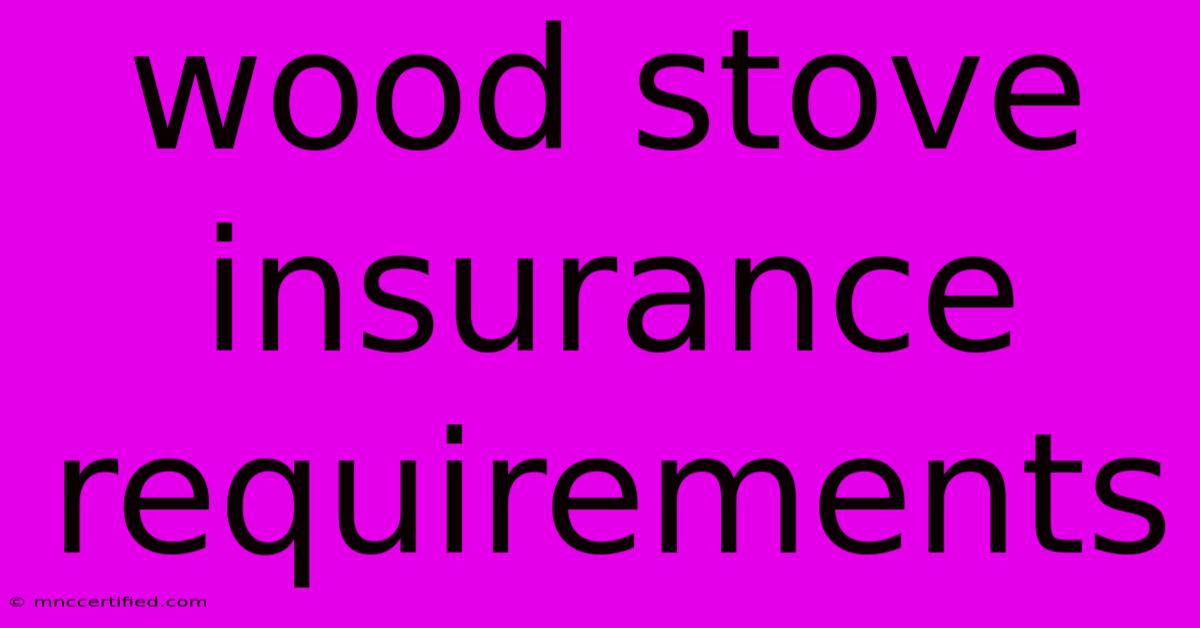Wood Stove Insurance Requirements

Table of Contents
Wood Stove Insurance Requirements: A Comprehensive Guide
Buying a wood stove can be a fantastic way to heat your home, offering a cozy ambiance and potential cost savings. However, before you settle in by the crackling flames, it’s crucial to understand the wood stove insurance requirements that could impact your homeowner's or renter's policy. Ignoring these could lead to significant financial hardship in the event of a fire or other related incident. This comprehensive guide will clarify what you need to know to ensure you're properly covered.
Understanding Your Insurance Policy and Wood Stoves
Most standard homeowner's and renter's insurance policies cover fire damage. However, the presence of a wood stove introduces additional risk, and your insurer may require specific measures to maintain coverage or even adjust your premiums. The level of scrutiny depends on several factors, including:
- Type of Wood Stove: The age, make, model, and installation type of your wood stove all play a role. Older stoves or those not meeting current safety standards might necessitate stricter requirements.
- Installation: Proper installation by a certified professional is paramount. Improper installation significantly increases the risk of fire, potentially leading to policy limitations or even cancellation. Keep all installation documentation readily available.
- Chimney Condition: A well-maintained chimney is crucial for safe wood stove operation. Regular cleaning and inspections are essential and often a requirement for insurance coverage. Schedule annual chimney sweeps and keep records of these inspections.
- Local Ordinances: Your local municipality may have specific regulations concerning wood stove installation and operation. Familiarize yourself with these regulations to ensure compliance.
- Fuel Storage: How you store your firewood can also influence your insurance policy. Improper storage increases the risk of fire spreading. Store firewood a safe distance from your home and wood stove.
What Your Insurance Company Might Require
To maintain coverage or obtain adequate protection, your insurance company might request evidence of:
- Professional Installation: Proof of installation by a qualified and licensed professional. This often includes a certificate of installation.
- Annual Chimney Inspections: Documentation demonstrating regular chimney inspections and cleaning by a certified chimney sweep.
- Working Smoke Detectors: Functional smoke detectors installed throughout your home, including near the wood stove.
- Proper Fire Extinguisher: A readily accessible and adequately sized fire extinguisher specifically designed for wood and grease fires.
- Fire Prevention Measures: Evidence of adherence to safe wood stove operating practices, such as proper ash disposal and maintaining sufficient clearance around the stove.
Consequences of Non-Compliance
Failure to meet your insurer's requirements regarding wood stove safety could result in several negative consequences:
- Increased Premiums: Your insurance premiums may significantly increase to reflect the higher risk associated with your wood stove.
- Policy Limitations: Your coverage might be limited or excluded for damages directly resulting from wood stove-related incidents.
- Policy Cancellation: In severe cases, your insurance company might cancel your policy altogether, leaving you without crucial protection.
Proactive Steps to Ensure Adequate Coverage
To avoid potential problems, take these proactive steps:
- Inform Your Insurer: Before installing a wood stove, inform your insurance company. Discuss your plans and inquire about any specific requirements they may have.
- Choose a Certified Installer: Always use a qualified and licensed professional for wood stove installation.
- Maintain Your Chimney: Schedule annual chimney inspections and cleaning.
- Practice Fire Safety: Follow all safety guidelines for operating a wood stove.
- Review Your Policy Regularly: Review your insurance policy annually to ensure it adequately covers your wood stove and related risks.
Conclusion:
Operating a wood stove safely and responsibly is essential, not only for your personal well-being but also for maintaining adequate insurance coverage. By understanding your wood stove insurance requirements and taking proactive steps to meet them, you can enjoy the warmth and charm of a wood-burning stove with peace of mind. Remember to always prioritize safety and communicate openly with your insurance provider.
Keywords: wood stove insurance, wood stove insurance requirements, homeowner's insurance, renter's insurance, wood stove safety, chimney inspection, fire safety, insurance coverage, wood stove installation, insurance policy, fire prevention.

Thank you for visiting our website wich cover about Wood Stove Insurance Requirements. We hope the information provided has been useful to you. Feel free to contact us if you have any questions or need further assistance. See you next time and dont miss to bookmark.
Featured Posts
-
Watch Nigeria Vs Rwanda Predicted Starting Xi
Nov 19, 2024
-
Jennifer Lawrences Post Baby Gown
Nov 19, 2024
-
Enjoy Thanksgiving Dinner In Utah
Nov 19, 2024
-
Gmail Rolls Out New Feature
Nov 19, 2024
-
Angelina Jolies Elegant Night Out
Nov 19, 2024